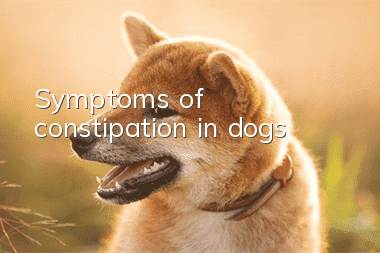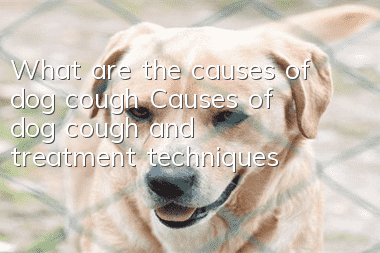Symptoms of constipation in dogs

Symptoms of constipation in dogs:
1. After dogs become constipated, they will continue to defecate forcefully in the defecation position and excrete a small amount of dry stool with mucus attached. Or a small amount of foul-smelling loose stools, or trying to defecate but not being able to pass it out easily, being nervous, barking, and frequently looking back at the abdomen. Then the appetite decreases or disappears, and the spirit becomes depressed. Some have vomiting, obvious tenesmus, abdominal enlargement, intestinal bloating and other phenomena.
2. After dogs become constipated, they are allergic to finger pressure on the anus, and dry and hard feces can be felt in the rectum. Or if you put on gloves and insert your fingers into the anus, you can obviously contact the hard feces, and the dog will show pain when pressing.
3. After constipation, dogs will suffer from gastrointestinal discomfort due to the accumulation of feces in the rectum, loss of appetite or exhaustion, vomiting, tail elongation, nervous gait, thirst, and rapid heartbeat. symptom.
4. Severely ill dogs excrete a small amount of liquid mixed with blood or mucus, the anus is red and swollen, and sometimes the anus protrudes, and defecation completely stops. At this time, the abdominal circumference begins to gradually increase, intestinal sounds weaken or disappear, and the abdominal wall touches During diagnosis, a bent cylindrical intestinal tube or a bead-shaped hard fecal ball can be felt in the abdominal cavity.
Prevention and treatment of dog constipation:
1. Administering laxatives in the early stage, combined with abdominal massage and enema, has a therapeutic effect. When treating laxatives, you can use 20 to 50 grams of sodium sulfate or magnesium sulfate, add 100 to 150 ml of water, and take it once. For safety, you can take 50 to 100 ml of vegetable oil or paraffin oil, and 500 to 1000 ml of warm soapy water or paraffin. 200~500ml oil for enema. Large dogs can take 1 to 2 tablets orally, and small dogs can take Kaiselu into the rectum.
2. When constipation lasts for too long and drug treatment is ineffective, laparotomy can be performed. In late-stage cases, surgical treatment is usually ineffective due to extensive congestion, edema, and necrosis in the intestinal tract.
3. For secondary constipation, the primary disease should also be actively treated at the same time.
- Causes and treatments for diarrhea and vomiting in Papillon dogs
- How many months will it take for Dogo dogs to be trained? How to train Dogo dogs!
- How to train a timid bear? Just a few steps!
- Dog deworming, is it reliable to use super trustworthy internal and external deworming for dogs?
- How to train a dog’s coordination? Teach you a few simple methods!
- What should I do if there are ticks on my dog? This treatment is scientific!
- Bull Terrier personality and appearance characteristics
- Things to note when raising a Pekingese dog
- What can’t German Boxer dogs eat?
- How to treat parvovirus in dogs? How to detect and prevent parvovirus in dogs?



